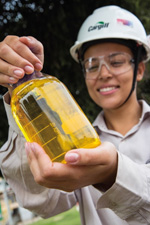Helping rural farmers, reducing CO2
In a remote region of Brazil, a Cargill biodiesel program is helping smallholder farmers improve their livelihoods.
January 18, 2016
About 50 kilometers from the border with Paraguay, along rough dirt roads that wind through the fields without a single sign to mark the way, is Caroline Balbino’s 30-acre corn and soybean farm.
Here, in a remote corner of Brazil near a town called Dourados, a Cargill program is helping Balbino and her neighbors find a new level of prosperity that previously they’d only imagined.
It began when Cargill entered the biodiesel market in Brazil about four years ago, converting all production at its Três Lagoas soybean refinery to biodiesel and related byproducts. The change meant new sourcing requirements for the soybeans that Cargill buys.
In Brazil, the government has mandated that biodiesel processors must source roughly 30 percent of their soybeans from smallholder family farmers in order to get a “socially responsible” stamp on their product and access the bulk of the market.
 Soybeans from farmers go to the Três Lagoas plant where they are tested and eventually converted into biodiesel.
While most biodiesel processors in Brazil have smallholder programs, the majority shop their programs out to third party agencies or partners with local co-ops to administer them. Cargill saw an opportunity to strengthen our relationships with smallholder farmers by taking a more hands-on approach.
Soybeans from farmers go to the Três Lagoas plant where they are tested and eventually converted into biodiesel.
While most biodiesel processors in Brazil have smallholder programs, the majority shop their programs out to third party agencies or partners with local co-ops to administer them. Cargill saw an opportunity to strengthen our relationships with smallholder farmers by taking a more hands-on approach.
Help for smallholders
In Balbino’s front yard, flowerpots are scattered on packed dirt in front of her house, which is painted a rosy pink. A mango tree casts partial shade on her vegetable garden.
This life looks much different than the one she had just a few years ago.
Balbino used to be a member of the “Movimento Sem Terra”—rural poor without land to farm who frequently live in makeshift favelas, or slum huts, constructed from sticks and plastic tarps. Small clusters of their dwellings pop up along the rural highways across Mato Grosso do Sul.
Roughly a decade ago, when the previous owner of a large soybean farm outside Dourados went bankrupt, the land was distributed to about 2,800 people like Balbino.
However, many lacked the know-how or capital to properly farm the land, so they often ended up leasing it back to large enterprises. Then, in 2011, Cargill introduced its family farmer biodiesel program and things began to improve.
“When we arrived here, there was nothing,” said Balbino, who lives with her grown son. “We have a house now. We’re not afraid to invest money to increase our production. Cargill pays on time; whenever we sell to Cargill, we get cash in the bank.”
As part of Cargill’s program, farmers receive ongoing technical support from Instituto Biosistêmico, known as IBS, including regular visits and soil analysis based on a program that IBS developed with Cargill’s own crop analysts.
As part of Cargill’s program, farmers receive ongoing technical support from Instituto Biosistêmico, known as IBS, including regular visits and soil analysis based on a program that IBS developed with Cargill’s own crop analysts.
One clear sign that farmers value Cargill’s approach: At the Mato Grosso do Sul elevators, volumes of smallholder-sourced soybeans went up 190 percent from year one (14,700 metric tons in 2011) to this year’s crop (42,500 metric tons). Cargill continues to receive positive feedback from the farmers.
The Benefit of Biodiesel
Biodiesel is widely used to fuel buses and trucks in large urban centers, and has several environmental benefits. Cargill’s Três Lagoas mill has achieved International Sustainability and Carbon Certification, which includes calculating the greenhouse gas emissions of the supply chain. The result? Cargill’s biodiesel emits 59 percent less CO2 in the atmosphere than traditional fossil fuels, exceeding Europe’s biofuel standard of 35 percent.
Room to grow
The soybeans that Balbino sells to Cargill make their way east to its soybean crush and biodiesel refinery at Três Lagoas. The facility processes about 640,000 metric tons of soybeans into nearly 130,000 metric tons of biodiesel annually.
For this volume of production, Cargill must originate upward of 200,000 metric tons of soybeans from eligible smallholders. Cargill already is expanding its soybean crushing production at the Três Lagoas plant. This means that Cargill’s family farmer program will need to continue growing in order to source enough soybeans. Biodiesel production will grow up to 220,000 metric tons per year.
“This is a chance to make a substantial difference for smallholder farmers while at the same time securing a steady supply of soybeans for our operations,” said Elcio de Angelis, commercial manager of biodiesel for Cargill Grain & Oilseed Supply Chain Brazil. “Now the farmers are growing and thriving together with us.”
